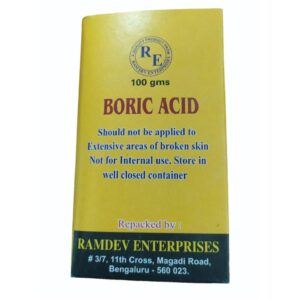BORIC ACID
BORIC ACID: Boric acid is a white, crystalline compound that is used primarily as an antiseptic and insecticide. In medicine, it is commonly used as a treatment for various infections, particularly fungal infections.
The exact mechanism of action of boric acid is not well understood. It is believed to work by disrupting the cell membrane of microorganisms, making them unable to grow and reproduce. Boric acid also has mild antifungal and antibacterial properties.
Boric acid can be used to treat vaginal yeast infections, as well as certain eye and ear infections. It is usually available in the form of capsules or suppositories for vaginal use.
The recommended dose of boric acid for vaginal use is usually 600 mg inserted into the vagina, once per day, for up to two weeks. However, it is important to consult a healthcare professional before using boric acid, as the appropriate dose may vary depending on the condition being treated.
When used as directed, boric acid is generally considered safe. However, it can cause certain side effects, such as mild vaginal irritation, burning, or watery discharge. If severe side effects occur, such as persistent irritation or bleeding, it is important to discontinue use and seek medical attention.
It is worth noting that boric acid should not be ingested orally or used on open wounds, as it can be toxic and lead to serious side effects. It should also be avoided by pregnant women, as it may cause harm to the fetus.
As with any medication, it is important to follow the instructions provided by the manufacturer or healthcare professional and to discuss any concerns or questions with a healthcare provider before using boric acid.



